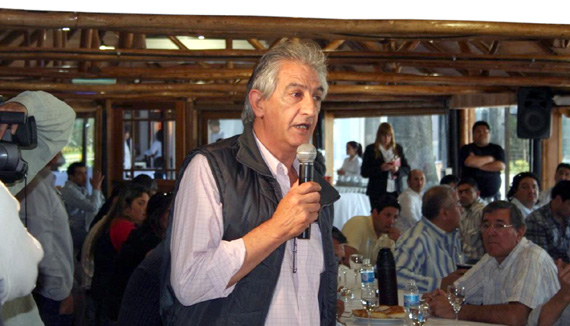|
During the
Second Conference of Mercosur Meat Industry Workers, recently held in Buenos
Aires, Argentina, Sirel spoke with
Carlos Figueroa, institutional relations secretary of the Argentinean Union of
Rural Workers and Stevedores (UATRE), the organization that hosted the event.
-What did you
think of this activity?
-After
listening to the various reports presented by fellow meat industry workers from
across Mercosur, our assessment is that, as we feared, we are in a very
difficult situation, perhaps one of the most complicated situations we’ve ever
faced.
So it is
perfectly clear to us that we must unite and work together towards achieving the
basic common goal of preserving jobs. That must be our foremost objective,
because if things continue as they’re now, I don’t know what will happen to us.
|
We view with great
concern the vast expanses of land taken up by soybean crops in
Argentina, and also the great number of breeding cows that have been
slaughtered, as both these phenomena will generate serious problems
for employment in rural areas. |
-In UATRE’s
opinion, what are the causes behind this crisis?
-We view with
great concern the vast expanses of land taken up by soybean crops in
Argentina, and also the great number of breeding cows that have been
slaughtered, as both these phenomena will generate serious problems for
employment in rural areas. Which is why we are firmly defending lemon production
activities in the province of Tucumán, and pear and apple production in the
provinces of Río Negro and Neuquén, activities that have a high concentration of
workers. Soybean crops,
on the other hand, generate practically no jobs.
The difference
in this sense is enormous:
soybean production employs one
worker per one thousand hectares, while fruit production creates four jobs per
ten hectares.
That’s the reason why we want to protect these activities, and we’re fighting
for a greater presence of these products in exports, as a way to preserve jobs.
-How important
is the new Coordinating Body for the Meat Industry?
-It’s very
important. We’re seeing how Brazilian companies are buying up meatpacking plants
in Argentina and in Uruguay, only to shut them down completely or
suspend activities, placing all the workers on temporary unemployment, without
giving them any clear indication if and when they plan to resume activities. We
think the message is clear: Brazil wants to monopolize meat exports from
Mercosur. This seems to be the scenario we’ll have to face from now on.
The IUF’s
role has been instrumental in these coordination efforts, because it’s an
organization that gathers all the trade unions that represent workers in
agriculture and the food industry, it maintains an ongoing active presence, and
has had the capacity to develop proposals and cooperate whenever it’s been
necessary.
 |